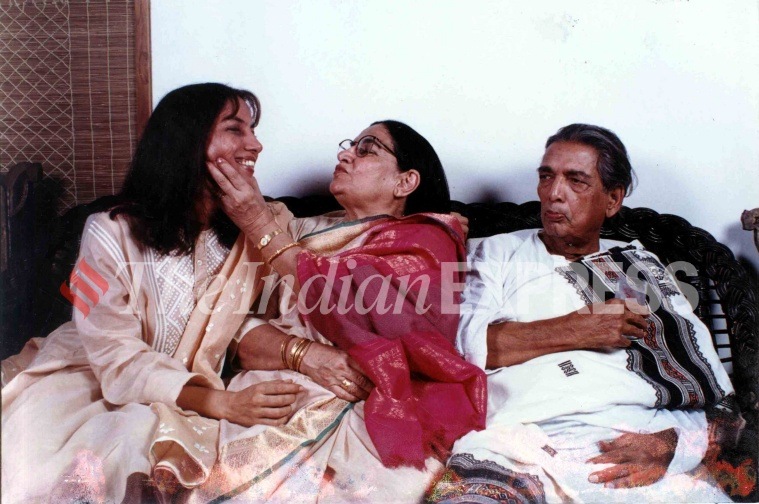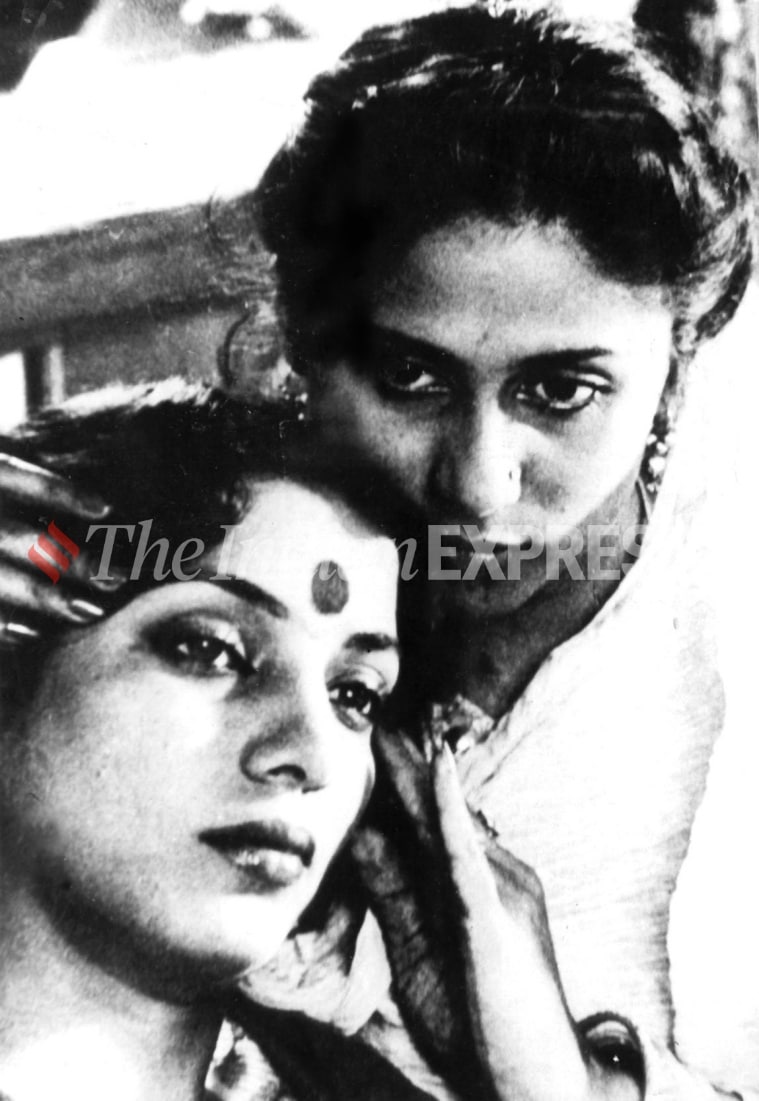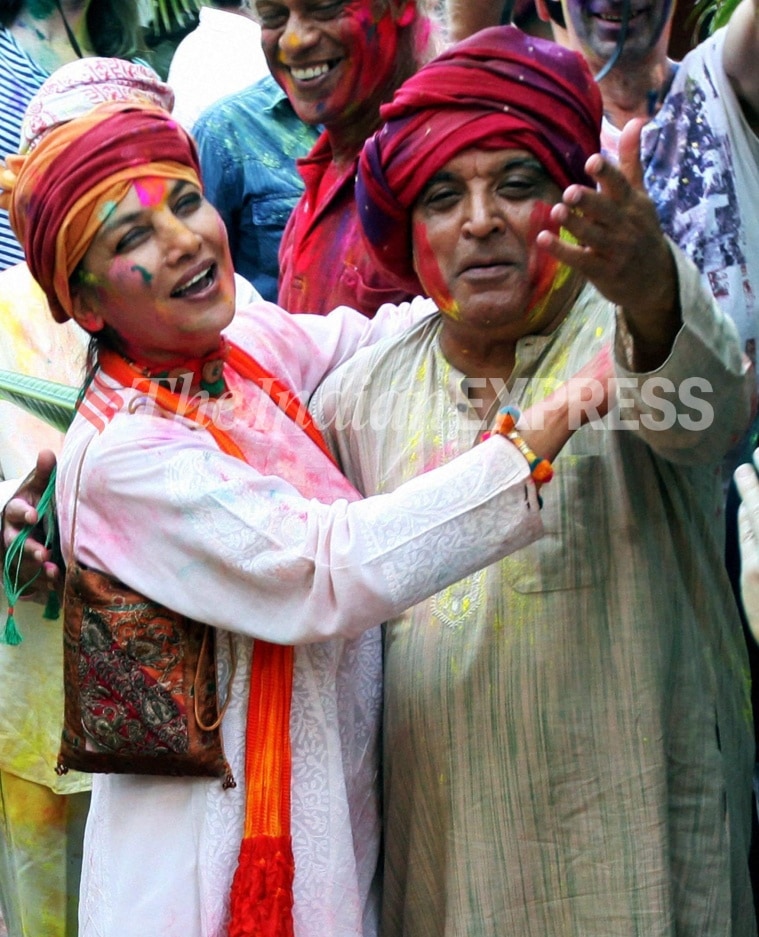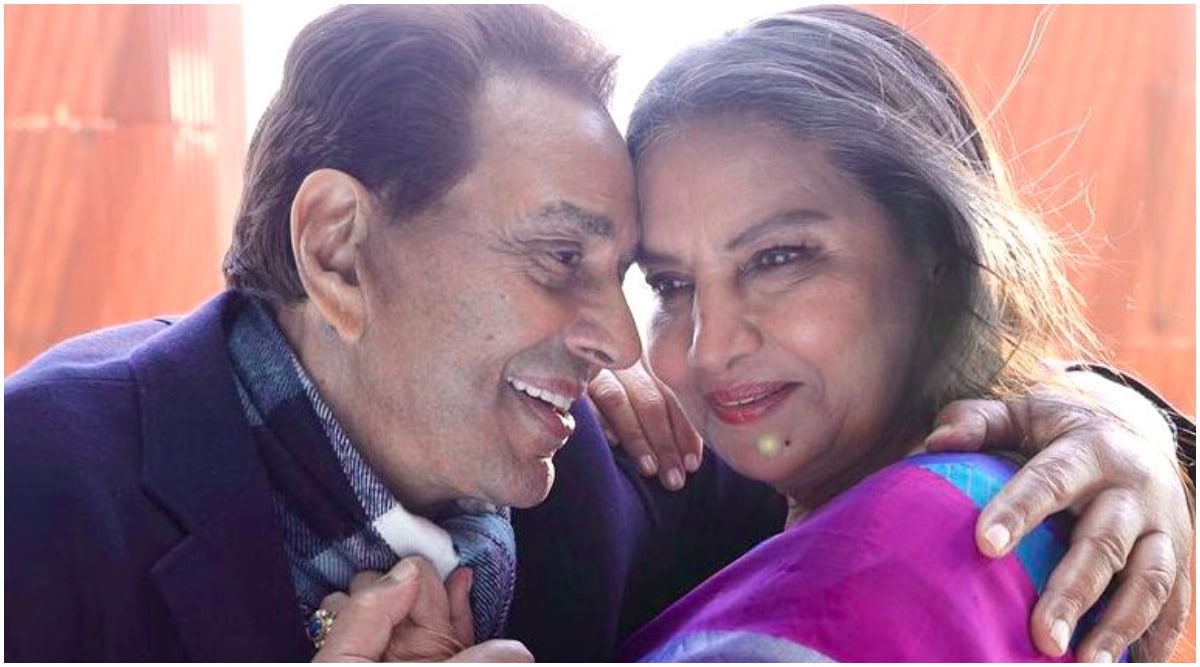Dressed in handloom fabric and with barely any makeup on her face, Lakshmi entered the 70mm screen as a peasant girl, who got pregnant out of wedlock but refused to abort the child despite societal pressure. The actor won the audience as she displayed conflicting emotions – despair, distrust, guilt, attraction and repulsion – beautifully. The actor was Shabana Azmi, who bursted on screen in Shyam Benegal’s feature film debut, Ankur (1974). The scintillating performance won her a National Award for Best Actress, and the film became the harbinger of an era in Indian cinema that ran “parallel” to the mainstream Hindi film industry.
Since then, Shabana’s filmography became an assortment of films belonging to mainstream cinema and parallel cinema, and every performance left an indelible impression on viewers. She switched to mainstream pastures, realising that to attract an audience to her non-conventional films, she had to be a popular face in commercial cinema, but she kept her eyes and ears open for interesting offbeat roles.
Shabana, the ultimate chameleon, immersed herself in a variety of roles — the wronged woman in Arth, the conflicted wife and mother in Masoom, the dreadful witch in Makdee, the girl in love in Amar Akbar Anthony, the grieving mother in Neerja, and most recently the star-crossed lover in Rocky Aur Rani Kii Prem Kahaani. Her brilliance at her craft made her the unprecedented winner of the National Award five times: Ankur (1974), Arth (1983), Khandhar (1984), Paar (1985), and Godmother (1999).
Shabana Azmi’s childhood and the influence of her parents’ ideology
Born to noted poet Kaifi Azmi, and actress Shauqat, Shabana grew up at Red Flat Hall of the Communist party, alongside kids of the members of the party. The atmosphere at home, she described in one interview, was “completely bohemian.” She often found herself in the company of highly intellectual people who came to meet her father. But, her father’s profession was beyond the understanding of a young Shabana. “He didn’t go to ’office’ or wear the normal trousers and shirt like other ‘respectable’ fathers but chose to wear a white cotton kurta-pyjama 24 hours of the day,” she once said about Kaifi Azmi in an interview with Screen magazine. In fact, she believed it was “unconventional” for her to be her parents’ child. And, she kept lying to her friends about who her father was until the day his name appeared in the newspaper as a lyricsist for a film.
 Shabana Azmi with her mother Shaukat Azmi and father Kaifi Azmi. (Express archive photo)
Shabana Azmi with her mother Shaukat Azmi and father Kaifi Azmi. (Express archive photo)
Eventually, Shabana began spending time in the august company of her father and his friends, and per her mother Shaukat, she grew into a “responsible and caring activist” because of the time she spent with her father. Shaukat wrote in her memoir, ‘Kaifi and I’, “From her childhood, she was present at gatherings where progressive intellectuals discussed and debated current affairs and the human condition. She enjoyed hanging around poets and writers like Sajjad Zaheer, Josh Malihabadi, Faiz Ahmad Faiz and Firaq Gorakhpuri who were our regular houseguests. Often Shabana would accompany Kaifi to his trade union meetings where she loved being pampered by the labourers.”
Before becoming a responsible individual, Shabana was an insecure child. She attempted suicide twice because she thought her mother loved her brother, Baba Azmi, more. “As a little girl Shabana was convinced that I loved Baba more than I loved her,” wrote Shaukat, while narrating how one morning she gave a bread toast from Shabana’s plate to Baba who was running late for the school bus. The nine-year-old didn’t take her mother’s action well. At school, “she went to the laboratory and took some nila thotha (copper sulphate).” But she was saved because “poison had passed its sell-by date.”
Later, Shabana threw herself in front of a train after Shaukat scolded her for being rude. This time she was saved by the school watchman who pulled her back. Both instances left Shabana’s mother “distraught” and she decided to “think twice before telling her off.” But as per Shaukat, Shabana’s hyper-sensitivity also made her earn more to help her family financially. She sold coffee at petrol stations, earning Rs 30 a day.
Advertisement
Shabana Azmi’s first bout with acting
Shabana Azmi studied at St. Xavier’s College and started a Hindi Theatre Group with her senior Farooq Shaikh. Together, they won awards in inter-college drama competitions. However, the first time Shabana got inclined towards acting in films was after watching Jaya Bhaduri’s performance in Suman. She sought her father’s permission to become an actor, and he told her (as Shaukat shared in her memoir), “‘I’ll support any choice you make. If you choose to become a cobbler I shall support you, provided you become the best cobbler in the business.”
 Shabana Azmi and Nandita Das starrer Fire generated a lot of controversy.
Shabana Azmi and Nandita Das starrer Fire generated a lot of controversy.
Shabana joined the Film and Television Institute of India and topped her class. During the final year of her acting course, she was offered Khwaja Ahmad Abbas’ Faslah and Kantilal Rathore’s Parinay. But Shyam Benegal’s Ankur, earlier rejected by Waheeda Rehman, became her debut film. Talking about casting Shabana, Shyam had told Mumbai Mirror, “One look at Shabana and I knew she was perfect for Laxmi.” Though the actor was quite young for the role, the filmmaker was ready to “tweak” it for her. He didn’t even audition her, leaving the actor surprised.
Impressed with Shabana’s “huge range” as an actor, Benegal also signed her for his other films, Nishant and Junoon, which was followed by the brilliant, Mandi. The bawdy black comedy featured an outstanding performance by Shabana as the brothel madam Rukminibai. She was accompanied in the film by her acclaimed contemporary, Smita Patil, with whom she had also shared the screen in, Arth.
Advertisement
[youtube https://www.youtube.com/watch?v=xY2P6IAd0MI%5D
Rivalry with Smita Patil
However, the two actors didn’t see eye to eye. Shabana admitted to Mahesh Bhatt (Arth’s director) that Smita’s success “disturbed” her. But years later, Shabana regretted saying unpleasant things about Smita. In an interview with NDTV, Shabana said, “We had a rivalry since we belonged to similar backgrounds. Her parents were also associated with the socialist movement, my parents were also associated with it. She started with Shyam Benegal, just like I did. So, we used to meet so much that ideally, we should have been friends. But, I think I also made a mistake by saying unpleasant things about her. I am ashamed of what I said.”
Jaya Bachchan also gave her two cents on the difference between Shabana and Smita. She once said in an interview, “The difference between Smita Patil and Shabana Azmi was like the difference between Meena Kumari and Geeta Bali. Shabana is more like Meena Kumari, she is studied, she knows how she would look, how she would act or do a scene, and she has prepared it all. But when it comes to doing it, she does it very naturally, positively. Meanwhile, Smita Patil was totally unaware of her presence, of her talent, which was very raw, and there is a lot of beauty in something which is very raw.”
 Shabana Azmi and Smita Patil in Mandi. (Express archive photo)
Shabana Azmi and Smita Patil in Mandi. (Express archive photo)
Shabana never played by the rules in her four decade career, which boasts of a filmography of over 100 movies. In 1996, with the Deepa Mehta film Fire, she delivered a fiery performance as she vouched for acceptance of homosexual relationships as she played one of the two sisters-in-law from a traditional household who fall in love with each other. She made some bold choices with films like Libaas (1988), Masoom (1983), Sparsh (1980) and Godmother (1999).
In mainstream cinema, which Shabana thought gave her a wider audience, she nailed the stereotypical roles in films like Amar Akbar Anthony (1977), Parvarish (1977), and Avtaar (1983, among others. Some of them also required her to sing and dance around the trees. Though not comfortable dancing, she still did it and accepted it as a challenge. In an interview she said, “Initially, I was very awkward in the song situation. I would think what kind of things I am doing being Kaifi Azmi’s daughter and a graduate of St Xaviers College. Dance was another difficult position to be in. But what I had to unlearn was that you are not doing anyone a favour and that the commercial cinema will die if Shabana Azmi won’t do a film; they will cast anyone else. So, you can’t hide your weakness behind the garb of awkwardness. Instead, accept that you do not know something, but still, you have to do it.”
[youtube https://www.youtube.com/watch?v=vxI6wPgeJBQ%5D
Advertisement
And that is how, Shabana Azmi carved a niche in both mainstream and parallel cinema, even as she did serious theatre on the side. She also gained international recognition for her roles in Madame Sousatzka (1988), City Of Joy (1992) and The Reluctant Fundamentalist (2013). But, she never was “terribly impressed” with herself as an actor. She once told Simi Garewal, “I think I have moments which are inspired and are very truthful, there are moments which are very honest and heart rendering, but a lot of times, it’s also extremely mediocre and incompetent work.”
Even as she grew old, Shabana didn’t stop getting offers to play the lead roles, a rarity in the Hindi film industry where actresses are boxed in the role of a mother as soon as they hit 40. But, she also has regrets about not being offered an out-and-out comedy drama.
Advertisement
Shabana Azmi — the social activist
While entertaining people, Shabana also used her art as an instrument for social change, a principle followed by her parents, Kaifi Azmi and Shaukat. She worked for the housing rights, basic amenities, schools and health facilities for more than fifty slum colonies in Mumbai. In 1986, when a twenty-five-year-old slum in Mumbai was demolished, she joined a hunger strike in protest. While her husband Javed Akhtar warned her against joining the protest, her father told her, “Best of luck, Comrade.” She even got arrested once on charges of rioting as she joined slum dwellers in protest against demolition.
But throughout her struggles, be it personal or professional, a man who stood beside her every time was her best friend and husband, Javed Akhtar. She got attracted to him as she saw qualities in him similar to her father. “Both have a strong sense of propriety, are extremely takkaluf-pasand and cannot brook mediocrity. Both are also hugely political animals,” Shabana told Screen. However, when Shabana met him, Javed was already married and had two children. People close to her warned her against the relationship. Even her mother was unhappy with the relationship. So, she asked her father, “Do you think Javed is the wrong man for me?” ‘He is not wrong, his circumstances are,’ came the reply.'”
Advertisement
 Shabana Azmi with her husband Javed Akhtar celebrates Holi at their residence in Mumbai. (PTI Photo)
Shabana Azmi with her husband Javed Akhtar celebrates Holi at their residence in Mumbai. (PTI Photo)
Shabana convinced him that he would change his circumstances and got the blessings of her father. She married Javed Akhtar in December 1984. Being a remarkable poet, lyricist and screenwriter, many often wonder how romantic he would be to his wife. But Shabana has clarified that he has ‘no romantic bone’. “There’s a lot of friendship between us. Javed is fond of saying that Shabana is my best friend. And this friendship is so strong that even marriage could not ruin it,” Shabana once told Filmfare.
Most Read
Not only Javed, Shabana also stays friendly with his former wife, Honey Irani and her two children, Farhan and Zoya Akhtar, and for this cordial family bond, she credits Irani.
At 73, Shabana has no intent to stop starring in movies and bringing whatever change she can bring in the society with her roles. She would, in fact, would like to “die with her boots on”.
 Dharmendra and Shabana Azmi in Rocky Aur Rani Ki Prem Kahaani. (Photo: Dharmendra/ Twitter)
Dharmendra and Shabana Azmi in Rocky Aur Rani Ki Prem Kahaani. (Photo: Dharmendra/ Twitter)
“I’ve been lucky to be at the right place at the right time. But I hope that the best is still to come. There are many things I’d still like to do; I really want to explore one genre — horror… I’ve realised that the thing I enjoy most in life is acting. I’d like to die with my boots on,” she recently told The Indian Express.
"sold" - Google News
September 18, 2023 at 09:33AM
https://ift.tt/iZRqNC2
Shabana Azmi: The ‘hypersensitive’ child who sold coffee at petrol pumps, went on to win 5 National Awards - The Indian Express
"sold" - Google News
https://ift.tt/ngoXQj8
https://ift.tt/KZrH8IR
Bagikan Berita Ini














0 Response to "Shabana Azmi: The ‘hypersensitive’ child who sold coffee at petrol pumps, went on to win 5 National Awards - The Indian Express"
Post a Comment